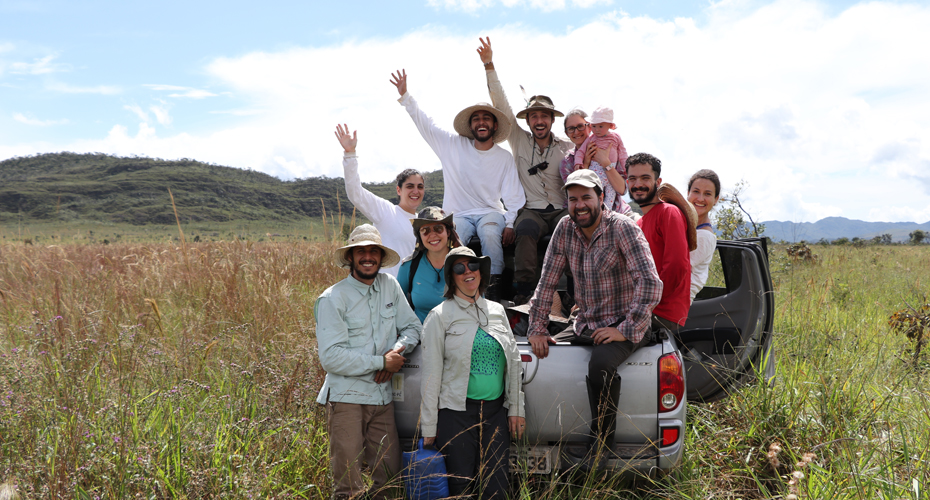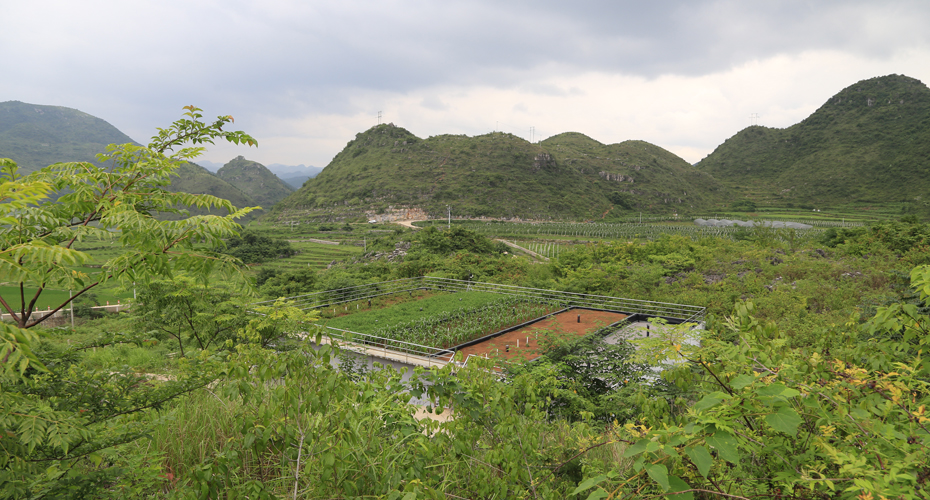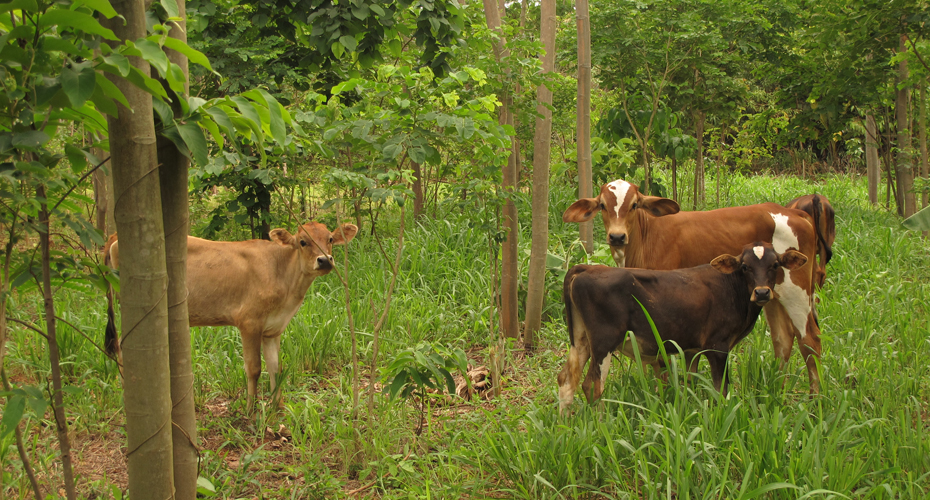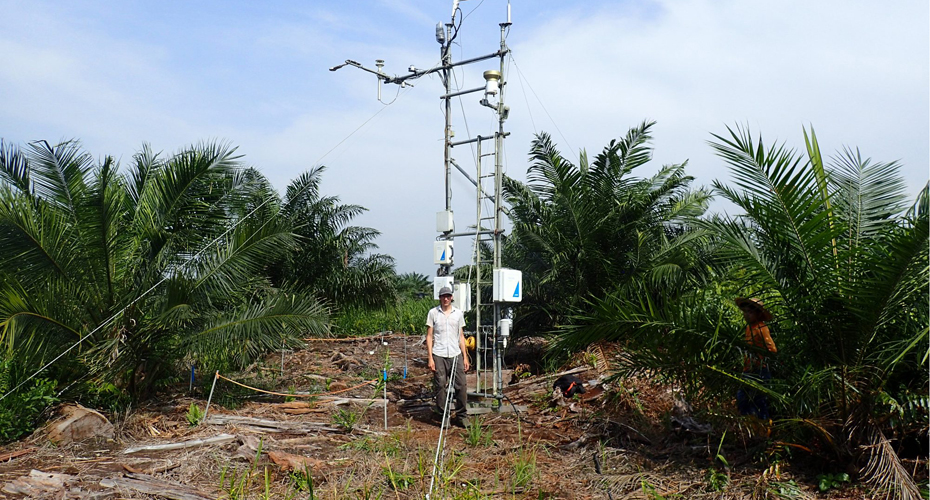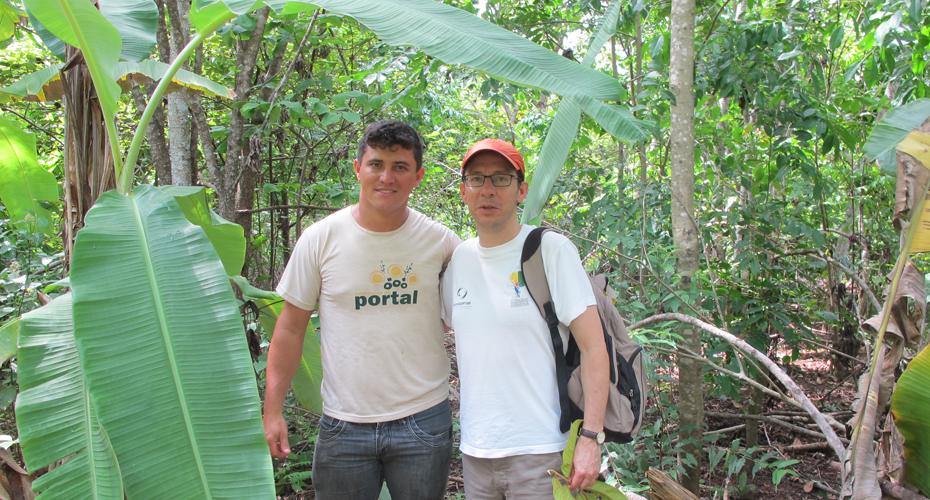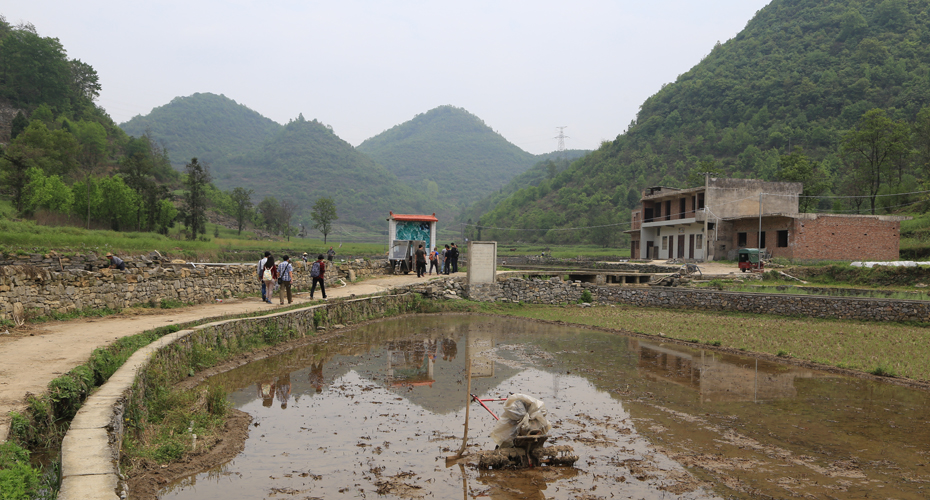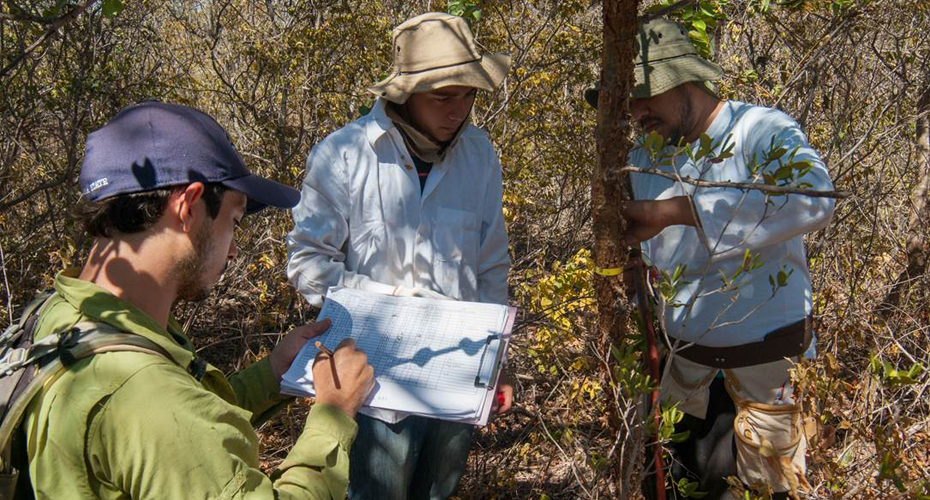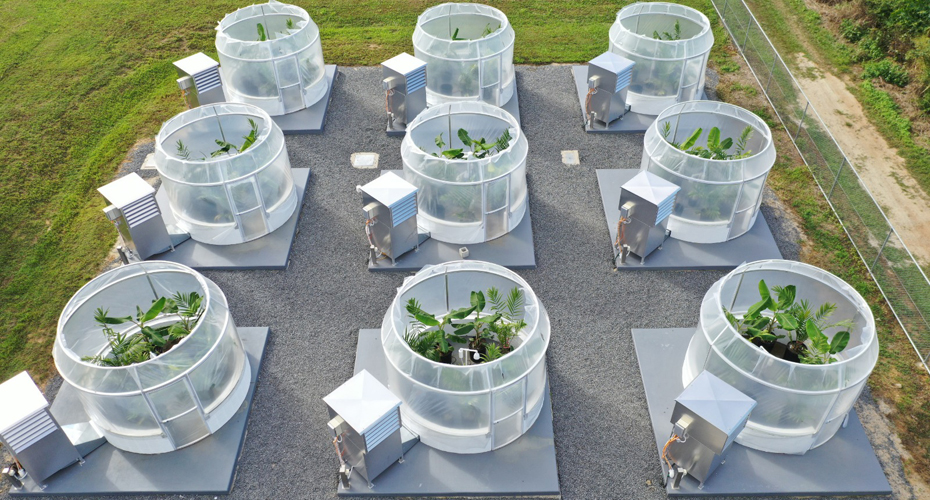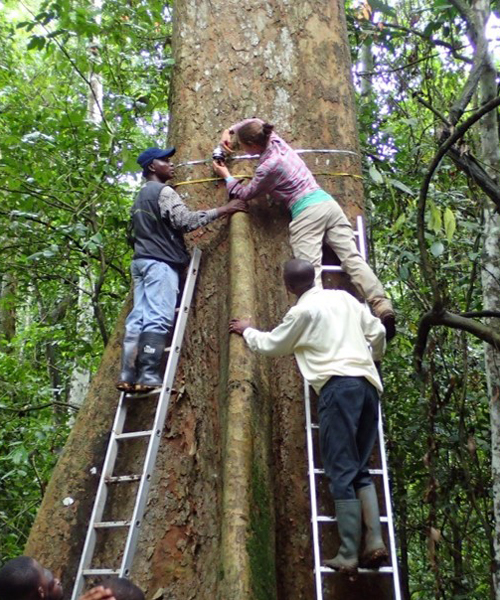
Lucy Rowland installing sensors to measure water flux in trees in tropical rainforest in Ghana.
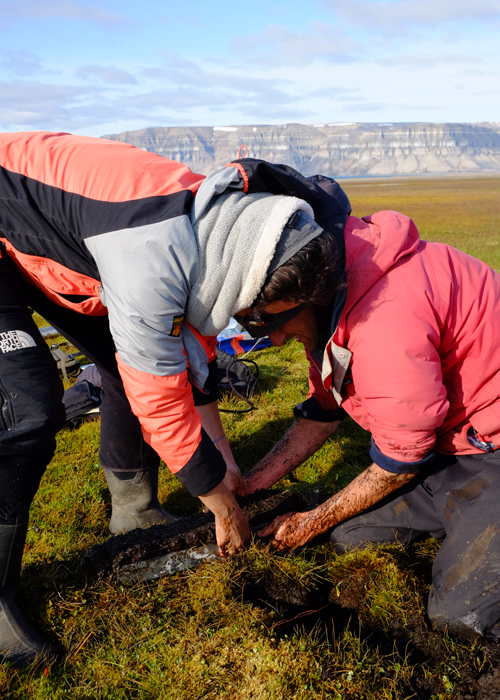
Matt Amesbury and Angela Gallego taking a core in Sassendalen, Svalbard
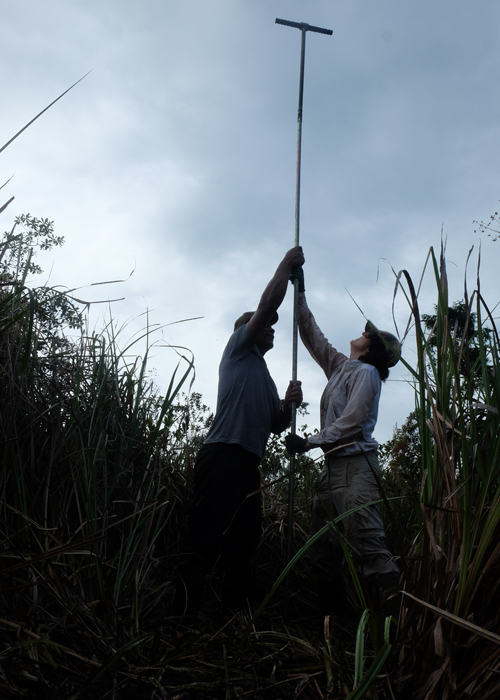
Angela Gallego taking a 6m long peat core in Oropel, Panama
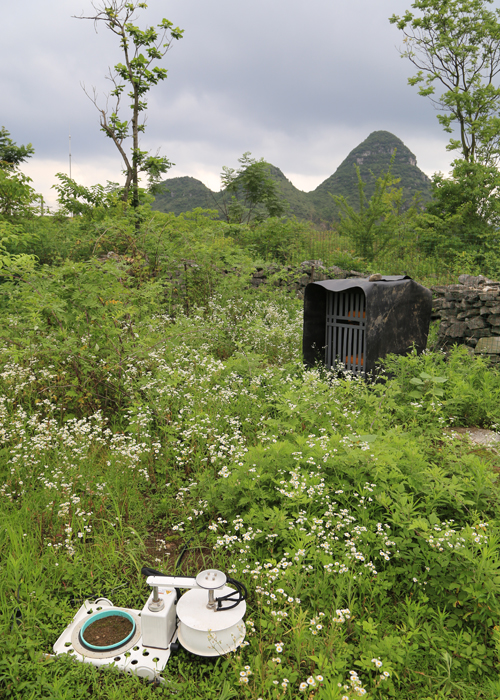
Carbon cycle investigation in recovering Karst Ecosystems at the Puding Karst Ecosystem Research Station, Guizhou Province, China
Terrestrial Ecosystem Restoration and Adaptation (TERA)
Terrestrial ecosystems are vitally important for biodiversity and contribute multiple ecosystem services. They are undergoing rapid change due to deforestation, degradation, and climate change, particularly in the tropics. For this reason, the UN dedicated 2021-2030 as the “Decade for Restoration”, with large-scale restoration a main policy lever for land-based climate mitigation (i.e. pathways to net zero). However, there are many challenges in successful land restoration and adaptation, involving multiple stakeholders, and covering a wide range of spatio-temporal scales.
This research cluster builds on the University of Exeter’s established strengths in carbon, water, and nutrient cycling, with expertise in biodiversity, ecosystem functioning and modelling, to build and apply the fundamental scientific knowledge base to inform successful ecosystem restoration and adaptation.
The group’s recent research has included:
Understanding global biomes
We have:
- made major advances in quantifying Amazonian forest productivity and change, the impacts of fire, land-use change, air quality, forest response to drought and the role of soil nutrients in the region;
- studied the resilience of tropical ecosystems to environmental change across the pan-tropics;
- studied acclimation of tropical montane forests to climate change;
- taken trace gas measurements in tropical Asian Oil Palm;
- studied processes driving functioning of peatland ecosystems at high latitudes and the role of tropical peatlands in the carbon cycle;
- investigated the role of nutrient cycling in controlling mature forest and grassland responses to rising atmospheric CO2 concentrations;
- led major projects examining soil carbon dynamics in a range of terrestrial environments, from the role of erosion in agricultural systems to the biogeochemical consequences of permafrost thaw at high latitudes.
Pioneering technologies and techniques
We have:
- applied novel technologies, e.g. drones to capture landscape scale vegetation change;
- applied remote-sensing techniques (UAV, airborne LIDAR, satellite EO) to tropical forests, savannas and semi-arid ecosystems;
- developed global models of vegetation structure and function.
Developing and applying land management solutions
We have:
- applied global models of terrestrial ecosystems and the land carbon cycle, e.g. to study the role of land-based climate mitigation to avoid dangerous climate change;
- studied how land-use perturbs ecosystem service delivery and to identify approaches to minimise/reverse damaging impacts of soil erosion and land degradation;
- developed economical flux based assessments of nature based solutions;
- undertaken pioneering research in upland landscape and tropical savanna restoration to help create landscapes more resilient to land use and climate change;
- led the DRYFLOR network of >80 Latin American researchers and conservationists working in neotropical dry forests. We support conservation and livelihoods with focus on agroforestry and ecosystem restoration in some of the world’s most threatened tropical forests and savannas.
- studied peatland management, restoration and land use change impacts on peatland ecosystem functioning.
TERA group academics
Andrew Cunliffe
Andrew leads the Terrestrial Ecosystem Science and Services (TESS) Lab, with the overarching aim to improve understanding of how landscapes function and can be managed for sustainable social and ecological benefit. TESS has an applied research agenda to develop and share insights into sustainable ecosystem function across scales in socially just ways, making extensive use of geospatial tools combined with transdisciplinary approaches including spatial ecology and social science. TESS works closely with many partners, including those from academia and non-academic settings.
Ted Feldpausch
Ted's research focuses on understanding the impacts of land-use, fire, and climate change on tropical forests. His work spans the tropics with a major research focus on Amazonia studying wildfire effects on forests and soils, forest degradation, and secondary forest regrowth and restoration. Current projects include the Amazon PyroCarbon Project, which aims to understand wildfire impacts on soil organic carbon in recently burned Amazonian forests, and the SOS Amazon Project, which studies how forests respond to different forms of disturbance, including post-deforestation regrowth, selective logging, and fire. His other research studies the impact of lightning on forests and the carbon cycle, ecology of dryland vegetation (e.g., Cerrado), fire regimes past and present and their impact on tropical forests, and land-use effects (e.g., pasture and agriculture) on ecosystem services.
Angela Gallego-Sala
Angela is a biogeochemist with expertise in climatic regulation of carbon fluxes in terrestrial ecosystems. Her particular ecosystem of interest is peatlands and she has purposely worked on peatlands situated in different climatic zones to have a global perspective on these ecosystems.
Kees Jan Van Groenigen
Kees Jan is a biogeochemist who studies how plants and soils respond to environmental changes and land use. His work focuses on carbon and nutrient cycles in ecosystems like grasslands, croplands, and forests, with a special interest in the role of soil microbes. He uses tools such as lab experiments, isotopic tracers, and biomarkers to better understand these processes. Kees Jan uses meta-analysis to explore big-picture issues like climate change, food security, and sustainable farming. He’s also a guest professor at Nanjing Agricultural University, where he works on making rice farming more productive and environmentally friendly.
Iain Hartley
Iain’s research focuses on how rates of carbon and nutrient cycling in terrestrial ecosystems are controlled, with a particular emphasis on soil processes. In particular, he studies the impacts of climate change and rising atmospheric CO2 levels on a diverse range of ecosystems, as well as how land can be better managed for climate change mitigation.
Lina Mercado
Lina’s research includes forest responses to climate change with focus on responses to warming and CO2 in the tropics and temperate region and influence of nutrient availability on their responses to climate. She further studies terrestrial biogeochemical cycles with focus improved understanding and quantification of carbon cycle fluxes of photosynthesis and ecosystem respiration.
Toby Pennington
Toby’s research ranges from plant biogeography to palaeoecology to conservation, with focus on Latin America, where he has worked across 10 countries. In recent years most research has focused on biodiversity, biogeography and ecology of dry biomes in the tropics. Much of his work has implications for conservation and livelihoods including projects with focus on tree-based agriculture and ecosystem restoration.
Lucy Rowland
Lucy’s research focuses on how tropical ecosystems, from humid tropical rain forests to dry forest and savannas, respond to environmental change and how detailed measurements of plant responses to environmental change can help us better understand and predict how to conserve vegetation across the tropics, as the climate changes. Lucy’s research also focuses on improving techniques to restore tropical ecosystems in a way which promotes their resilience to future changes in climate and helps us to address both the global biodiversity and climate crisis.
Stephen Sitch
Stephen’s research focuses on the role of terrestrial ecosystems in the contemporary global carbon cycle, and attribution of the land sink to underlying processes. He is deputy-director of the Global Carbon Budget Office at the University and leads the TRENDY international ensemble of Dynamic Global Vegetation Model project. He also complements his work on process-based modelling with the use of Earth Observation to inform regional and global carbon budgets.
Dunia Urrego
Dunia’s research focuses on responses of biodiversity to environmental change, human-landscape interactions and understanding historical climate change. Currently she leads a group of researchers investigating ecological consequences of megafaunal extinctions, resilience and ecological baselines of tropical biodiversity, historical fire activity, the tropical signal of abrupt climate events, and mangrove forest development and carbon sequestration.
Claire Belcher
Tim Hill
Richard Tennant
Gabriel Yvon-Durocher
| Project | Exeter PI | Funding |
|---|---|---|
| SEnsitivity of tropical forest to HEat stress Trop-Heat, 2023-2026 | Lina Mercado | NERC £800k |
| Amazon-SOS: A Safe Operating Space for Amazonian Forests, 2024-2028 | Stephen Sitch | NERC £3.5m |
| Modelling multidimensional causes and impacts of extreme fires in the climate system through X-ECV analysis, 2024-2027 | Stephen Sitch | ESA €2m |
| Next Generation Modelling of Terrestrial Carbon Cycle by assimilation of in-situ campaigns and Earth Observations, 2025-2029 | Stephen Sitch (Co-Investigator) | EU Horizon €12m |
| Oppenheimer Programme in African Landscape Systems | Andrew Cunliffe | Philanthropic £2.3m |
| Tropical peatlands and the carbon cycle, 2020-2025 | Angela Gallego-Sala | ERC €2.57m |
| Diversifying tree based grazing systems to create smallholder price premium opportunities for milk production in the Amazonian Arc of Deforestation | Toby Pennington | GRTA £615k |
| BioResilience: Biodiversity resilience and ecosystem services in post-conflict socio-ecological systems in Colombia | Ted Feldpausch | NERC NewtonFund ColombiaBio £1.4m |
| Quinquennial (half-decadal) carbon and nutrient dynamics in temperate forests: Implications for carbon sequestration in a high carbon dioxide world, Oct 2019-Sept 2024 | Iain Hartley | NERC large £850,000 |
| Restoring Neotropical dry ecosystems - is plant functional composition the key to success? | Lucy Rowland | NERC-FAPESP £1.3m |
| Lightning: An invisible driver of tree mortality in the tropics? | Tim Hill | NERC £800k |

